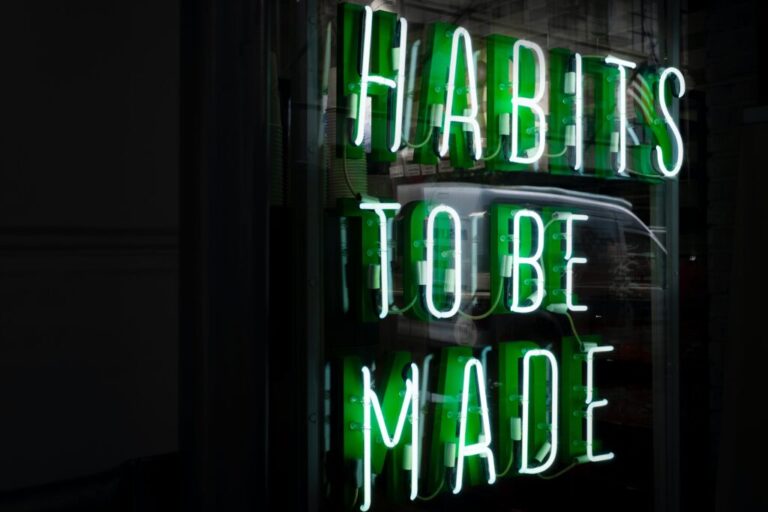Often when we’re discussing habits, it is the bad habits that we want to get rid of — how to break the cycle. But we can also talk about the good habits we want to create.
A habits, simply put, is a routine or behaviour that is repeated regularly enough that it tends to occur subconsciously. That’s where the true power of a habit lies, you want to consciously do it often enough that it becomes something you don’t even need to think of when you do it.
So very many of our daily actions are done out of habit. We turn off the alarm clock, get out of bed, stretch, these are all small habits.

We don’t consciously think about how we want to move our legs out of bed, we just swing them out and away we go. Do you make yourself a coffee in the morning, or do you buy one on the way to work? Both habits. A whopping 43% or nearly half of our daily behaviours are performed out of habit.
New behaviours can become automatic through the process of habit formation. Old habits are hard to break and new habits are hard to form because the behavioural patterns that humans repeat become imprinted in our neural pathways.
But don’t worry, because it is possible to form new habits through repetition. When behaviors are repeated in a consistent context, there is an incremental increase in the link between the context and the action.
There are three stages of a habit. The trigger, the action, and the reward. The trigger is the thing that makes us want to do the action. If you see someone smoke on television, you may want to have a cigarette, so you are triggered. Then if you have a smoke, that is the action, and in this case, the reward is the sensation you get from smoking. Usually the process is a little more subtle.
Driving is a whole bunch of little habits all strung together. You don’t think about them at all, they happen nearly automatically. It’s why so many people struggle with parallel parking – it just isn’t done often enough to become a habit. Those who excel at it are likely in a city where it is the norm.
It doesn’t just take repeated effort to form a habit, it must be repeated so much that it slips from conscious mind to the subconscious. One study found that the average time for participants to reach the height of automaticity was 66 days with a range of 18–254 days. So if you’re working on a New Years resolution, you might need to keep it up until about March 7th in order to get it into your subconscious!
When you’re looking to make something automatic, you want it to be efficient, unintentional, uncontrollable and a complete lack of awareness. If you have to think about it, you’re still in your conscious mind.
Experimentation is a great way to get habits into the subconscious — first you have to believe they’re possible before they can become a habit. If you want to run when you first wake up, you need to get rid of all the friction between you now and the you who already does this run.
Friction is seen as the things that stop you from doing your actions. A friction in this case may be that you need to get dressed twice, so I’ve heard of people who actually sleep in their running clothes. They jump out of bed and put their shoes on and away they go. Then they come home and start their normal morning routine, getting undressed (as though from pyjamas) and into the shower and then all the other steps.
Experimenting allows you to sit down and work out all these instances of friction ahead of time, and then when you try it out, you might realize there are other instances you hadn’t even thought of, so you need to address those, too.
Once you’ve worked out the friction, the next important thing to focus on is the reward. The best habits have the reward written in to the end of the action. Like the example of having a cigarette. It’s why it’s so difficult to break that habit. Maybe if you want to be a runner, you reward yourself with a tasty smoothie when you get home. Or maybe you need new runners to make it exciting, and you relish their comfort. Usually the reward system can be triggered even by a sensation of a job well done. Without the reward, the action will not become a habit. Remember, there are three parts: Trigger, Action, Reward.
If you can build your new habits with this trio of parts, and keep repeating it (for 66 days maybe?) you just might have a chance at slipping it into your subconscious.
Remember to start small. We don’t go from no habit to a huge new habit overnight. One of my colleagues suggests a gratitude list as a good place to start. Make it a habit every day to come up with 3 things you are grateful for. You can do it first thing in the morning, or the last part of the day before sleep. Just make sure to do it every day, no skipping.
If you’re struggling, reach out for a free 30 minute Discovery Call. I’d love the opportunity to help you get this habit thing done right.
Subscribe to get the latest posts sent to your email.
Copyright © 2024 by Rev. Stephen B Henry PhD.
All rights reserved.
Another Website by Ultimate Virtual Solutions
Design • Content • SEO